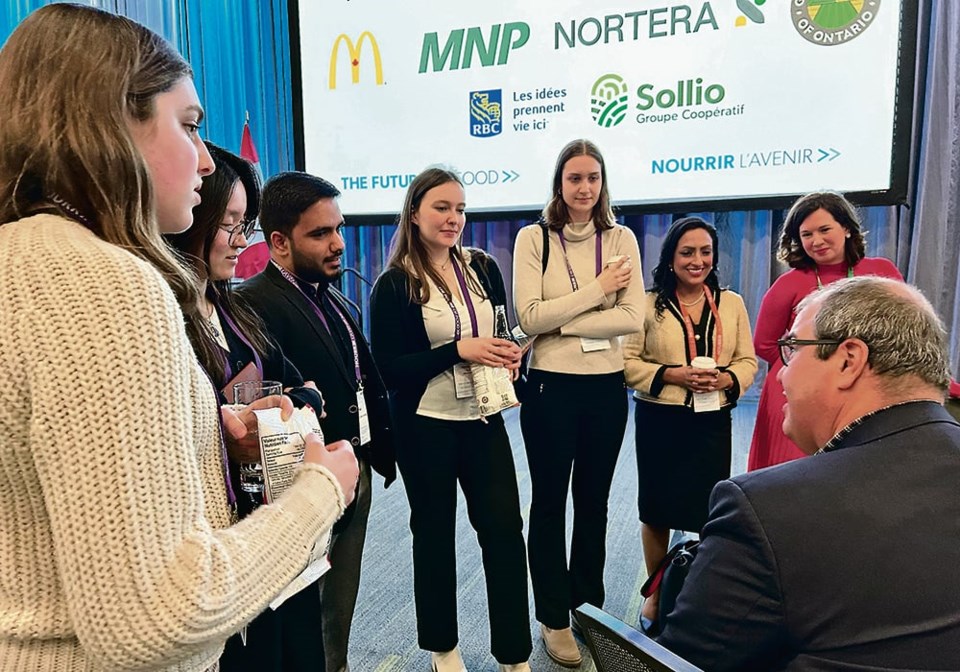WESTERN PRODUCER — Some people in Canadian agriculture take Canada for granted.
That does not include most immigrants, temporary foreign workers and people tightly connected with overseas communities. Those people, many of them working on western Canadian farms, in barns, in ag machinery manufacturing, in slaughter plants, driving trucks and providing professional services, tend to look back to their countries of origin with relief that they’re here.
Canada’s economic, political and social problems pale in comparison to those of most other countries. The people who complain the loudest about how terrible things are here tend to be those whose families have been here longest. They’ve lost connection with the overseas reality that drove their ancestors to immigrate.
Somebody who doesn’t take Canada’s politically stable reality lightly is Murad Al-Katib, who gave a rousing speech at Canada’s Agriculture Day in Ottawa. The Davidson, Sask., pulse processing mogul, president and chief executive officer of AGT Food and Ingredients, is not an immigrant. He’s a first generation Canadian.
Al-Katib saw his father and mother, immigrants from Turkey in 1965 and 1967, thrive in rural Saskatchewan, where his father spent 55 years as a local doctor and his mother became the first immigrant Muslim woman elected to a rural municipal council.
You can bet his parents’ new-to-the-Prairies optimism was knitted deep into his fabric, and he tried to stitch that into the crowd of more than 700, which included dozens of young farmers and agriculture students from across much of Eastern Canada.
“I bet on Saskatchewan and the western Canadian farmer,” said Al-Katib.
“Canada has such an advantage. It’s worth the risk.”
He has been confident enough in Canada to pour whatever capital he can make and attract into an ever-expanding ag-based marketing and processing empire. It is based in Regina, where my own parents settled in 1959. (I never heard them complain about Canada. They loveed Regina and Saskatchewan, and instilled in me a lifelong appreciation for this country.)
Farmers here invest too, at ever higher rates of capital exposure. Buying a piece of land, purchasing a combine, even buying top quality seed can be a hair-raising prospect for a farmer, but it can be done knowing that our land titles system is sound, our banking system is solid, a civil war is unlikely to break out, and we have courts, legislatures and Parliament to peacefully sort out our conflicts.
That isn’t true for much of this planet, as can be seen from a glance at the daily news. It is a relatively rare situation enjoyed mostly in the anglosphere, in the European Union, in Japan and 麻豆传媒AV Korea, and a handful of other places.
The situation is much different for farmers in China, Argentina and the Sahel, let alone Russia and Ukraine. There’s not much a farmer there can count on, other than the unpredictability of the weather.
For many of us, it is disturbing to see our peaceful, democratic, southern neighbour treading dangerously close to the edge of chaos. Its government is dysfunctional to an extreme, its ability to protect its own democratic system is in doubt and its stability after the upcoming election is in question. If you’re not disturbed by this, you should be.
Here in Canada, we often absorb American culture like it’s our own. We can come to believe what we see on Fox or CNN reflects what’s going on here. We can begin to echo sentiments that don’t fit our reality, but they become infectious.
We shouldn’t take our blessing of stability for granted. It is a feature of Canadian farming that attracts people and money to this industry and country. It’s our selling point.
People here often say silly things like “Eff Trudeau,” as if he’s an arch-woke radical, or implausibly describe Pierre Poilievre as a “far-right” reactionary, when most of his positions are off-the-shelf conservatism.
Like most things Canadian, both fellows are quite moderate and reasonable, which we should celebrate. We don’t need to make our politics more exciting than they are. Whoever wins the next election is unlikely to launch or provoke a civil war or the end of democracy.
Al-Katib noted that Canada has an extremely rare trifecta of strengths: lots of arable land, sometimes-adequate water and a solid work ethic among the population. That’s something we can all build on.
It’s how we built this wonderful society.
And, when I saw young people surround Al-Katib after his speech, seeking more of his wisdom, I know it is a combination we should embrace and carry into the future. In this country you can invest in farming with confidence, and nobody should take that for granted.




